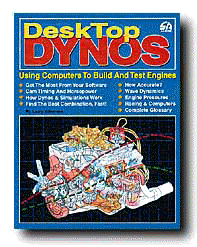|
 Overview:
The 128-page DeskTop Dynos book was
written especially for the performance engine enthusiast. The result of
several years of research, this easy-to-read guide contains a completely
unique look at high-performance engines: A view from the perspective of the
simulation designer. While most engine builders and enthusiasts developed
their skills from years of hands-on tinkering, the background of the
simulation expert is thermodynamics, wave dynamics, and the physics of
motion. Each of these "camps" have their own insight into how engines work,
however, the exchange of knowledge between academia and the engine shop has
been almost non-existent. It's been non-existent, that is, until now! Overview:
The 128-page DeskTop Dynos book was
written especially for the performance engine enthusiast. The result of
several years of research, this easy-to-read guide contains a completely
unique look at high-performance engines: A view from the perspective of the
simulation designer. While most engine builders and enthusiasts developed
their skills from years of hands-on tinkering, the background of the
simulation expert is thermodynamics, wave dynamics, and the physics of
motion. Each of these "camps" have their own insight into how engines work,
however, the exchange of knowledge between academia and the engine shop has
been almost non-existent. It's been non-existent, that is, until now!
DeskTop
Dynos explains how many of the "mysteries" of the internal-combustion engine
can be understood using wave dynamics and other simulation techniques (for
an excerpt, click here). Without resorting to
complex math or physics, DeskTop Dynos clearly shows WHY the dimensions of
internal engine passages are the key to unlocking more horsepower. You'll
discover why most camshaft timing specs are simply advertising "hype"
instead of useful descriptions of camshaft function. You'll find out how
bore and stroke affect pumping work and how that can add and subtract power.
But most importantly, DeskTop Dynos will show you WHY it is virtually
impossible to predict power changes from most combinations of components
without simulating the complex physics at work within the engine. No engine
expert on earth can analyze the interactions of pressure, heat, and mass
flow within an engine and accurately predict the outcome. But that's exactly
what engine simulation software does in just minutes! DeskTop Dynos will
give you new insight into how this process works and the knowledge to use
this technique to build more horsepower into any engine.
Technical:
128 page, 8-3/8 x 10-7/8
soft-bound. DeskTop Dynos contains hundreds of photos and detailed drawings.
ISBN 1-884089-23-2. Copyright (C) 1996-2009 by Motion Software, Inc. All
rights reserved. Printed in USA.
Availability:
DeskTop Dynos
is available directly from ProRacing Sim Software.
Click Here
to purchase. While Supplies Last! This quality technical book is a
"must-have" for any performance enthusiast.
-
 What's Inside DeskTop Dynos:
What's Inside DeskTop Dynos:
-
 How Engines And Simulations Work
How Engines And Simulations Work
-
 Get The Most From Engine Simulation Software
Get The Most From Engine Simulation Software
-
 Find Out How Cam Timing Really Affects Power
Find Out How Cam Timing Really Affects Power
-
 Clearly Explains Engine & Dyno Basics
Clearly Explains Engine & Dyno Basics
-
 Understand Engine Pressures And Horsepower
Understand Engine Pressures And Horsepower
-
 Details The Growth Of Simulation Science
Details The Growth Of Simulation Science
-
 Discover State-Of-The-Art Simulation Techniques
Discover State-Of-The-Art Simulation Techniques
-
 The Future Of Simulations And Racing Tech
The Future Of Simulations And Racing Tech
-
-
 Partial Table Of Contents:
Partial Table Of Contents:
-
 INTRODUCTION
INTRODUCTION
- ACKNOWLEDGMENTS
-
 ENGINE & DYNO BASICS
ENGINE & DYNO BASICS
- THE OTTO-CYCLE ENGINE
- THE OTTO-CYCLE PROCESS
- ENGINE TESTING
- WHAT THE DYNO MEASURES
- TORQUE
- POWER
- HORSEPOWER
- BY ANY OTHER NAME
- HORSEPOWER & TORQUE
- OTHER TYPES OF DYNOS
- THE HYDRAULIC DYNAMOMETER
- THE ELECTRIC DYNAMOMETER
- SCHIZOPHRENIC DEVELOPMENT
- ULTIMATE TRIAL-AND-ERROR TOOL
-
 SIMULATING ENGINE
PRESSURES
SIMULATING ENGINE
PRESSURES
- ENGINE PRESSURES
- INDICATED PRESSURES
- CRANK-ANGLE DIAGRAM
- VOLUME DIAGRAM
- CALCULATING HORSEPOWER
- CALCULATING PRESSURES
- INTAKE CYCLE PRESSURES
- POWER CYCLE PRESSURES
- EXHAUST CYCLE PRESSURES
- INDICATED HP AND MEP
- SIMULATING FRICTIONAL LOSSES
-
 THE GROWTH OF
SIMULATIONS
THE GROWTH OF
SIMULATIONS
- EARLY MODELING EFFORTS
- ZERO- AND QUASI-DIMENSIONAL
- MULTIDIMENSIONAL MODELS
- FILLING-AND-EMPTYING MODELS
- GAS-DYNAMIC MODELS
- ENGINE MODELING MEETS THE PC
- DYNOMATION
- THE FUTURE OF IC MODELING
-
 INSIDE FILLING-AND-EMPTYING
INSIDE FILLING-AND-EMPTYING
- BY ANY OTHER NAME
- ENGINE SIMULATION BASICS
- THE ON-SCREEN MENU CHOICES
- THE BORE/STROKE MENU
- WHAT’S A SHORTBLOCK
- BORE, STROKE, & COMPRESSION
- BORE AND STROKE VS. FRICTION
- FALLACY ONE
|
- FALLACY TWO: LONG STROKE
- CYLINDERHEAD AND VALVE MENUS
- CYLINDERHEADS AND DISCHARGE
- RAM TUNING AND PRESSURE WAVES
- CYLINDERHEAD MENU CHOICES
- CHOOSE SMALL/BIG-BLOCK HEADS
- VALVE DIAMETERS
- THE COMPRESSION RATIO MENU
- COMPRESSION RATIO BASICS
- CHANGING COMPRESSION RATIO
- C/R PRODUCES MORE POWER
- OTHER EFFECTS OF INCREASING C/R
- COMPRESSION RATIO ASSUMPTIONS
- THE INDUCTION MENU
- AIRFLOW SELECTION
- AIRFLOW MENU ASSUMPTIONS
- INDUCTION MANIFOLD BASICS
- MANIFOLD SELECTION ADVICE
- THE EXHAUST MENU
- EXHAUST WAVE DYNAMICS
- EXHAUST MENU SELECTIONS
- THE CAMSHAFT MENU
- CAM BASICS
- VISUALIZING VALVE EVENTS
- HOW VALVE EVENTS AFFECT POWER
- CAMSHAFT MENU/LIFTER CHOICES
- CAMSHAFT MENU/SPECIFIC CAMS
- 0.050-INCH & SEAT-TO-SEAT TIMING
- CAMSHAFT ADVANCE AND RETARD
- CALCULATING VALVE EVENTS
-
 GAS DYNAMICS AND
DYNOMATION
GAS DYNAMICS AND
DYNOMATION
- AN UNSTEADY FLOW MACHINE
- ACOUSTIC VS. FINITE-AMPLITUDE
- COMPRESSION AND EXPANSION
- PRESSURE WAVES AND TUNING
- PRESSURE-TIME HISTORIES
- GAS FLOW VS. ENGINE PRESSURES
- INTAKE TUNING
- INDUCTION RUNNER TAPER ANGLES
- PORT FLOW VELOCITIES
- EXHAUST TUNING
- EXHAUST FLOW VELOCITIES
- VALVE EVENTS AND STRATEGIES
- OPTIMIZE VALVE EVENTS
- APPENDIX A: SOFTWARE INSTALLATION
- APPENDIX B: GLOSSARY
- APPENDIX C: BIBLIOGRAPHY
|
|






Using Computers To Build Horsepower
